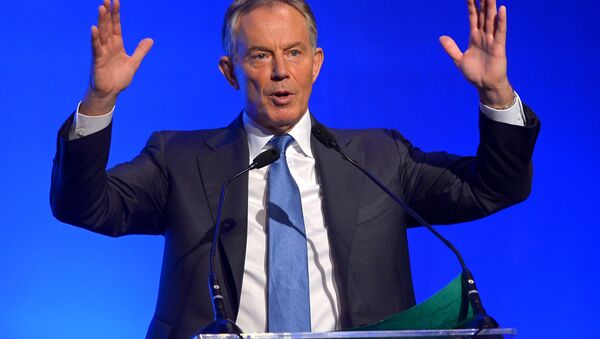Tony Blair, introduced by none other than Senator John McCain, was greeted by his audience with standing ovations and his speech was dotted with applause.
The meeting was closed, but The Guardian refers to a witness who shed some light on the proceedings. Apparently Blair struck a ‘more confrontational tone’ and said the root of the problem was a struggle within Islam about the nature of the faith.
This actually makes sense, but one has to wonder exactly how a Blair-proposed US-led alliance is going to teach followers of the Prophet Mohammed the ‘proper brand’ of Islam. Blair may be blessed with a lot of virtues but humility is probably not one of them.
Surely, radical Islam did not start with Tony Blair’s stint in Downing Street, nor with the 2003 invasion of Iraq, but his premiership certainly saw — and in the view of many caused — a huge growth of the toxic ideology. By invading Iraq on a totally false premise and destroying its army the US-UK led coalition sent thousands of displaced Iraqi soldiers and officers into the hands of extremist recruiters who made the most of their battle-hardened experience.
Generational or Civilisational?
Blair described the struggle against radical Islam as ‘generational’. It is not entirely clear what he meant by that — is it a struggle between different generations of Muslims or perhaps that this struggle will dominate the lives of whole generations? But ‘generational’ lends gravitas to the stratagem, sounds suitably big and also quite convenient for the future: we never promised that this struggle would be over quickly.
What Blair and those who give him standing ovations don’t seem to realise — or utter — is that radical Islam may not be the whole problem and may not even be the root one. According to statistics from Europol, less than two per cent of all recorded acts of terror were perpetrated with religious motivations, with an even smaller number being committed by Muslim extremists.
One explanation may be that radical Islam is just a conduit for channelling much wider discontent with outside interventionism — by the US and its motley coalition of the intermittently willing.
It is the US meddling which breeds anger, mistrust and resentment among many people around the world — from deeply religious nations to predominantly secular ones. It is just that Islam and its more radical — indeed, abhorrent — incarnations have emerged as a quasi-ideological base uniting people in many different countries in resisting the never-ending US meddling and plans to reshape the world.
Furthermore, the growing divide between the West and Islam in the world probably goes deeper: it is not just protest against interventionism. It is that Western civilisation has to a large degree lost its long-time attractiveness and appeal to the Muslim world. Reasons for that are probably many and complex but apparently the lure of things that Western civilisation has to offer has lost much of its lustre.
It can also be that things the West has to offer — and there is certainly quite a mix of the good, the bad and the ugly — are out of reach of most people or the mix is not to everyone’s taste, etc. Be that as it may, what we are definitely seeing is a revival of traditional Islamic values and the growing resentment and resistance even to the more benign western influences, let alone military interventions or ‘lessons in tolerance’.
Even in those countries that can be classed as Washington’s traditional allies in the Muslim world people adopt very unfavourable attitudes to the US and its policies and its very image, such as in Turkey and Pakistan.
Education, Education, Education?
On the question of ‘lessons in tolerance’: how does Blair account for the fact that of young Muslims that were born and bred in the UK about a third agree that apostates should be killed and an even greater share are generally in favour of Sharia laws for Britain? Is there a different curriculum and revision notes that Tony Blair proposes to use that would produce more agreeable results?
Meanwhile, there is plenty of evidence that it is US-led interventionism — with Blair as one of the most enthusiastic enablers — that creates ever new fault lines and plunges different regions of the world into crisis after crisis. Can you recall in the past quarter century any country or region that benefitted by US getting involved?
There is serious evidence that those places that have been targets of US-led intervention in various forms have become susceptible to radicalism. When talking about education, maybe that is exactly the lesson to be learned by Tony Blair and those who give him standing ovations either side of the pond.


